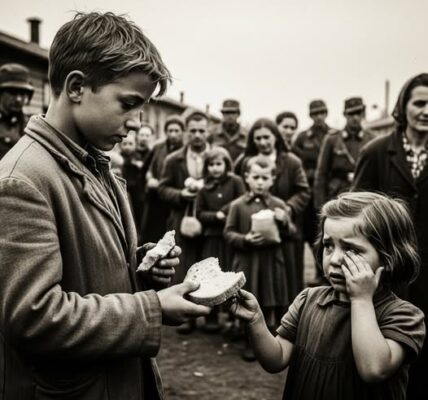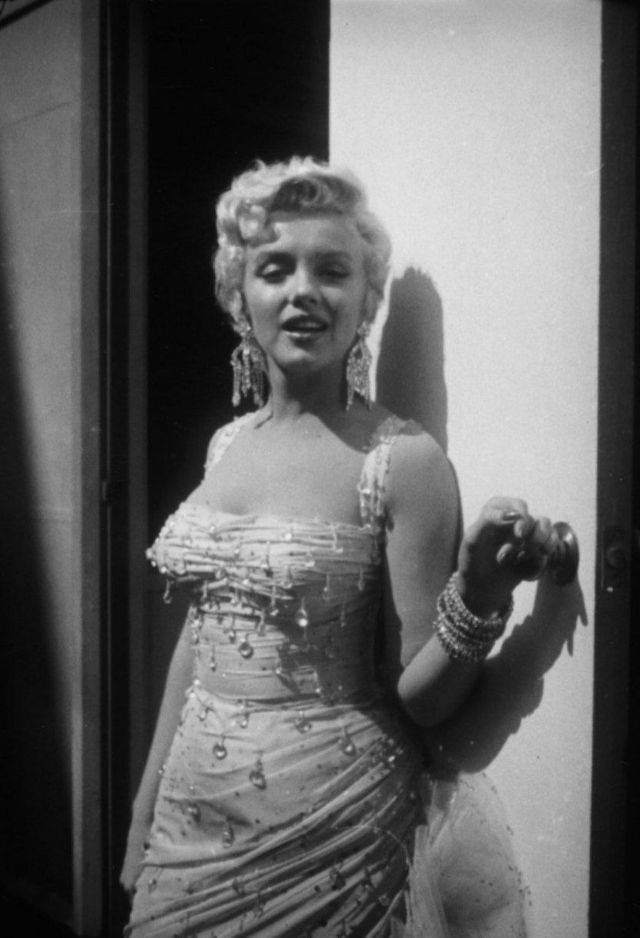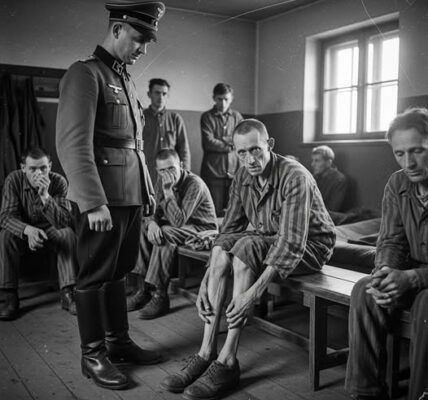The Mother Who Jumped Off the Train – Czechoslovakia, 1943

The winter of 1943 in Czechoslovakia blanketed the fields with a silent blanket of snow, as if nature wanted to muffle the sounds of screams and farewells. It was a time when death convoys traversed the countryside, lining up closed wagons, saturated with human shadows, toward a destination rumors were beginning to spread: Auschwitz. Villagers, hidden behind curtains, dared only furtively glance at the endless trains passing by. The cold seemed to freeze everything except the terror and the urgency of a doomed nation.
In one of these carriages, a mother clutched her infant daughter in her arms. The train lurched slightly as it rounded a curve, and the light filtering through the cracks in the wood failed to dispel the darkness saturated with breath, fear, and silence. For hours, the woman watched the train’s speed, waiting for a moment, a breath of respite, a tiny chance. She made her decision as soon as the soldiers slammed the doors shut: she would not take her child to Auschwitz. She would not surrender her daughter to that foretold death.
The sound of the wheels grew heavier and slower as the train wound through the snowy forests. Then, in an act of desperation and love, the mother smashed a window in the carriage. An icy wind immediately rushed in, stinging their faces. The other passengers watched her, some in horror, others silently praying for this senseless miracle to succeed. She kissed her daughter one last time, her lips trembling against the child’s still-warm skin. Then the words came, simple, clear, sharp as a knife: “Run!”
With a violent movement, she pushed her through the opening. Her small body tore through the air and tumbled into the deep snow of the ditch. The girl rolled, grazing, gasping for breath, but she survived. Behind her, the metallic clatter of the wagons resumed its course. The train didn’t stop. Her mother’s silhouette vanished into the darkness of the convoy, swallowed by the relentless machine of deportation.
That day, the snow became a silent witness to sacrifice: a child abandoned on the side of the railway tracks, a mother who decided to give life a second time by sacrificing her own. This gesture was a response to the barbarity that sought to deprive humanity of even the purest instinct: to protect its children.
The girl lay for hours, half-buried in an icy ditch, unable to comprehend the enormity of what had just happened. Her hands trembled, and her breath formed small white clouds in the winter air. Finally, several villagers discovered her. Their boots sank into the snow as they approached her fragile little body. Fear mingled with compassion in their eyes: helping a Jewish child meant risking their own lives. But that day, the instinct for solidarity was stronger than fear. They took her in, kept her warm, and hid her until the end of the war.
She never saw her mother again. But she grew up with the conviction that she bore an impossible debt. Throughout her life, she repeated the same phrase, like a credo passed down to her children and grandchildren: “My mother gave me life twice: once at birth and once on this train.”
This story, told in numerous postwar testimonies, symbolizes what the Holocaust was: a series of human tragedies, where absolute horror intersected with the most sublime gestures of love and courage. In the vast archives devoted to the Holocaust, numbers—six million victims, thousands of convoys—sometimes risk blurring the individual. But each number is a face, each train car contained mothers, children, and the unfulfilled promises of the future.

The sacrifice of this Czechoslovak mother is part of a truth that history cannot erase: even in the thickest darkness, the instinct to protect, love, and offer a glimmer of hope never fades. The trains departing for Auschwitz carried not only victims but also stories, intimate resistances, and gestures of humanity that defied death.
Even today, on the roads of Bohemia and Moravia, you can see modern trains traversing the same tracks. Their gleaming carriages, packed with distracted travelers, seem oblivious to the tracks they travel on. But for those who know history, each whistle is a reminder: here, death convoys passed, here, a mother chose the snow to save her child.
The duty of remembrance is not only to commemorate crimes but also to preserve the traces of these moments of invisible heroism. In an age when information travels at lightning speed and images of war are superimposed on screens, revisiting these extraordinary stories is imperative. They remind us that behind great tragedies, there are always hidden faces, choices, and sacrifices.
This little girl, now an old woman, wore this testimony like a silent medal. She survived not thanks to the army or politics, but thanks to the radical gesture of her mother, who in an instant transformed the death wagon into an act of resistance.
The snow cushioned her fall, but her mother’s love saved her. This story still tells us, with undiminished power, that even in the face of the Holocaust, life still strived to triumph.




